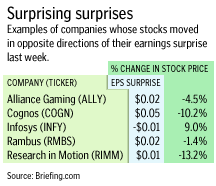
NEW YORK (CNN/Money) -
It's earnings season and hundreds of companies will be reporting quarterly results this week and next.
For the most part -- judging from newspaper headlines and coverage on CNNfn and CNBC -- investors will be asking one thing: Did the company meet or beat estimates?
But is that the right question? After all, you've read the reports: Cisco beats by a penny; Intel misses by a penny. Do all these pennies really matter?
Already this earnings season, the results are mixed. Software company Mercury Interactive, for example, reported earnings of 14 cents per share after the market closed last Thursday. That was 40 percent higher than the consensus estimate of 10 cents a share, and the stock surged nearly 20 percent on Friday. (Makes sense right?)
But last week, semiconductor company Rambus announced equally good results -- 7 cents a share, 40 percent higher than expectations. The following day, the stock drooped 1.4 percent on Thursday.
What gives?
In the case of Mercury Interactive (MERQ: Research, Estimates), the results really were surprising. After all, big software companies such as Oracle and PeopleSoft issued warnings for the current quarter in recent weeks. And the sector was on shaky ground after Siebel Systems CEO Tom Siebel was reported as predicting the demise of 100 to 200 information technology firms this year. Against that backdrop, Mercury shares had fallen 15 percent in the days leading up to the announcement of its good news.
Rambus's strong results, on the other hand, were no surprise at all. There's been increasing evidence that the depressed market for semiconductors is getting ready to rebound. Plus, Rambus (RMBS: Research, Estimates) soared in February after demonstrating a new memory chip. And the stock spiked more than 5 percent on Wednesday...before the earnings announcement.
Good news isn't always good news
Companies report their earnings every three months, typically two or three weeks after a quarter closes. And Wall Street analysts work throughout the quarter to come up with (to the penny) how much a company will earn.

Beating that estimate (a "positive surprise") is of course a good thing, suggesting fortunes for the company are improving and analysts just can't keep pace.
But that's not always the case. In fact, earnings surprises don't seem to be an accurate predictor of stock price movement at all. According to a study by William Kinney, an accounting professor at the University of Texas at Austin's McCombs School of Business, stocks moved in the opposite direction of the earnings surprise 44 percent of the time. Kinney's study examined surprises from 1992 to 1997.
Furthermore, the average loss for stocks missing earnings estimates by a penny per share was just 0.3 percent following the announcement, Kinney says. A third of the stocks that missed estimates by a penny gained more than 3 percent following the negative surprise while 22 percent of the stocks gained more than 6 percent. Kinney says the correlation was similar for companies beating earnings estimates by a penny. On average, stocks reported a slight gain but a sizable percentage posted a loss following the surprise.
Kinney speculates that part of the reason for this seemingly illogical performance is that for the most part the magnitude of surprises is decreasing for widely-held companies because there is little difference between the high and low estimates. Essentially, the surprises become almost meaningless because they tend to be so small.
And Joe Cooper, a research analyst with earnings tracking firm Thomson Financial/First Call, thinks that's a trend that has accelerated since the passage of Regulation FD, a Securities and Exchange Commission rule that bars companies from divulging information to a select few before disclosing it to everyone.
There's another problem: Because companies have become so adept at managing expectations, upwards of 60 percent of companies post positive surprises. "The market has come to expect firms to beat analyst estimates. When you report a little bit of good news it's not as good as it used to be," says Lawrence Brown, the Controllers RoundTable research professor at Georgia State University. Brown found in a study of earnings surprises from 1984 to 1999 that the percentage of small negative surprises has decreased from 21.8 percent in 1984 to 11.8 percent in 1999.
"Companies continue to do a fantastic job of managing expectations," says Cooper. "The jig is up. Everyone understands that now," says Cooper."
What now?
Investors are increasingly focusing more on what a company says about its future estimates when it reports results.
For example, Research in Motion, the maker of the popular Blackberry wireless e-mail device, last week reported a loss of 14 cents a share for its latest quarter. That was a penny less than the 15 cent per share loss Wall Street was expecting. But the company also told investors that it would lose more money in the current quarter than expected and that revenues would be lower. As a result, nobody cared about the positive surprise for the prior quarter and Research in Motion (RIMM: Research, Estimates) tanked, plunging more than 13 percent on Wednesday.
Valuation is another variable that investors need to keep in mind when a company reports a surprise. Yahoo!, which reported a first quarter revenue surprise on Wednesday night (earnings were in line with expectations), plunged 16 percent on Thursday. That's because analysts questioned whether or not Yahoo! could sustain its lofty earnings multiple. Before Thursday's drop, Yahoo! (YHOO: Research, Estimates) was up 112 percent since the market's low point in September and was trading at 184 times 2002 earnings estimates.

|

